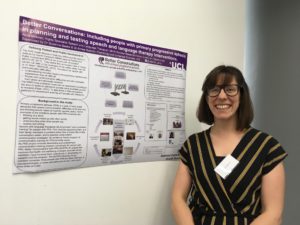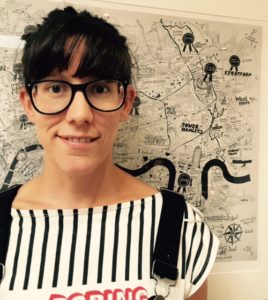 Each year the department where I work host an information evening for health professionals all about applying for post graduate funding, and each year I have been invited to talk about my experience of applying for an NIHR fellowship. Naturally, each year I revisit my slides and tweak them to prepare for the talk. This year it seemed particularly poignant, given that this is the last year of my funded NIHR Doctoral Research Fellowship. Once I have finished my PhD (and hopefully passed) I will be looking to applying for the next stage in the fellowship pathway. Re-visiting the application process has reminded me that although it seems like an enormous task (so many pages) just applying for the thing, it is achievable and well worth it.
Each year the department where I work host an information evening for health professionals all about applying for post graduate funding, and each year I have been invited to talk about my experience of applying for an NIHR fellowship. Naturally, each year I revisit my slides and tweak them to prepare for the talk. This year it seemed particularly poignant, given that this is the last year of my funded NIHR Doctoral Research Fellowship. Once I have finished my PhD (and hopefully passed) I will be looking to applying for the next stage in the fellowship pathway. Re-visiting the application process has reminded me that although it seems like an enormous task (so many pages) just applying for the thing, it is achievable and well worth it.
At the same event there was a talk from an experienced SLT researcher, Professor Karen Sage, who sits on one of the NIHR panels. She reminded us that the NIHR are not just looking at the protocol for the project that is being proposed, but at the person making the application and the team they have chosen to work with (their supervisors, institutions and mentors). At the time I applied for my fellowship I had not published any peer reviewed journal articles and I was ever so concerned that I was a ‘weak’ candidate. But when I look back over my slides I am reminded of all the other things I had going for me. I was a trained speech and language therapist with heaps of experience, I had written a book and some articles in my disciplines practice magazine, I was on the committee of a speech and language therapy clinical excellence network and a clinical adviser to the Royal College of Speech and Language Therapists. I had even been on TV, in a BBC documentary about a lady with a brain injury. These things didn’t feel like they amounted to much individually, but together they looked pretty good. I looked like someone who could influence the profession. I looked like someone who could disseminate work to my fellow speech and language therapists, and actually make a change.
So what about “my team”. I went to UCL as an undergraduate to study speech and language therapy. During this training we were taught about conversation in stroke aphasia, and the interventions that could be provided to support both people with stroke related aphasia and their families. My current primary supervisor- Associate Professor Suzanne Beeke was one of the lecturers teaching us this stuff. A few years later I went off to Australia in my mid-20s. I worked there and did a Masters in Clinical Rehabilitation. My research study in the Masters work I did centred on a self-management group for people with dementia (including language led dementia). I used lots of conversation work within the group. Back in the UK, I worked with people with language led dementia and identified that there was little research evidence for the communication partner training therapies I was using- focusing on conversation with people with language led dementia and their families in individual therapy sessions. I was using the interventions I had learnt about on my undergraduate, and the research that Suzanne had kept working on in stroke aphasia. Clinically I was translating this, tweaking this to meet the needs of my patients with language led dementia. It seemed obvious that if I wanted to do research in this area Suzanne would be a great person to approach about it.
 Suzanne and I started working together to put together my funding application for the NIHR. During this time I had secured some funding from Guys and St Thomas’s Charity to develop the speech and language therapy service within the early onset memory disorders service at South London and Maudsley NHS Foundation Trusts where I was working. Suzanne advised me in aspects of this work. Just working with Suzanne on both the project and the NIHR application itself was a great way to build of our working relationship. It meant I got a really good idea of how the supervisor-supervisee relationship would work. It also meant I could demonstrate my commitment. Suzanne and I explored who else might be able to support me on my fellowship application together. Suzanne had made connections with a Professor of Psychiatry here at UCL, Professor Martin Orrell, who had experience running trials of a behavioural intervention for people with dementia called Cognitive Stimulation Therapy. Given my plan for a potential pilot trial, this seemed ideal. We met with him and he was ever so supportive and agreed to act as a potential supervisor and sign my NIHR application.
Suzanne and I started working together to put together my funding application for the NIHR. During this time I had secured some funding from Guys and St Thomas’s Charity to develop the speech and language therapy service within the early onset memory disorders service at South London and Maudsley NHS Foundation Trusts where I was working. Suzanne advised me in aspects of this work. Just working with Suzanne on both the project and the NIHR application itself was a great way to build of our working relationship. It meant I got a really good idea of how the supervisor-supervisee relationship would work. It also meant I could demonstrate my commitment. Suzanne and I explored who else might be able to support me on my fellowship application together. Suzanne had made connections with a Professor of Psychiatry here at UCL, Professor Martin Orrell, who had experience running trials of a behavioural intervention for people with dementia called Cognitive Stimulation Therapy. Given my plan for a potential pilot trial, this seemed ideal. We met with him and he was ever so supportive and agreed to act as a potential supervisor and sign my NIHR application.
Alongside developing the protocol for the project, with guidance from the Research Design Service with whom I had a number of meetings, this work took about a year to put into place. This included wrangling with the finances (ouch), working out a good training programme, considering PPI and future dissemination etc. Everything needs to be thoroughly considered and justified. It felt like a great achievement to submit it. Phew.

After a few months of increasingly impatient foot tapping I found out I had an interview. This did mean, however, that I had to do a 5 minute (precisely) presentation and answer a whole bunch of questions for a panel of 18 interviewers. I meticulously planned my presentation and practised it till I was blue in the face. I tried to think through every possible question I might get asked, and every possible answer I could give. At this point I found out that Professor Martin Orrell was moving universities and thus could not act as my second supervisor. Suzanne and I got in touch with Professor Jason Warren, an experienced Neurologist and researcher in the area of language led dementia at UCL with an interest in therapy. He was so positive and supportive. Consequently I announced this change to my supervisory team at the interview. On analysis afterwards, I felt the interview itself seemed to go well in parts and terribly in others. I maintained a smile throughout and tried to appear enthusiastic and passionate. Now back to waiting.
I was sat in the Tate Gallery during the start of my daughter’s school summer holiday when I received an email telling me I had been awarded the fellowship! Brilliant. 4 years later this all feels like a long time ago. That said it was definitely worth it, it has been an epic journey and the time I invested in my NIHR application was well worth it. I jumped straight into my PhD and have been loving it. I am now writing up my thesis, thinking about the next NIHR application!
Author [1]
[1]
Anna Volkmer is a Speech and Language Therapist and NIHR Doctoral Research Fellow working in Language and Cognition, Department of Psychology and Language Sciences, University College London. Anna is researching Speech and language therapy interventions in language led dementia.
You can follow Anna on Twitter Follow @volkmer_anna [2]